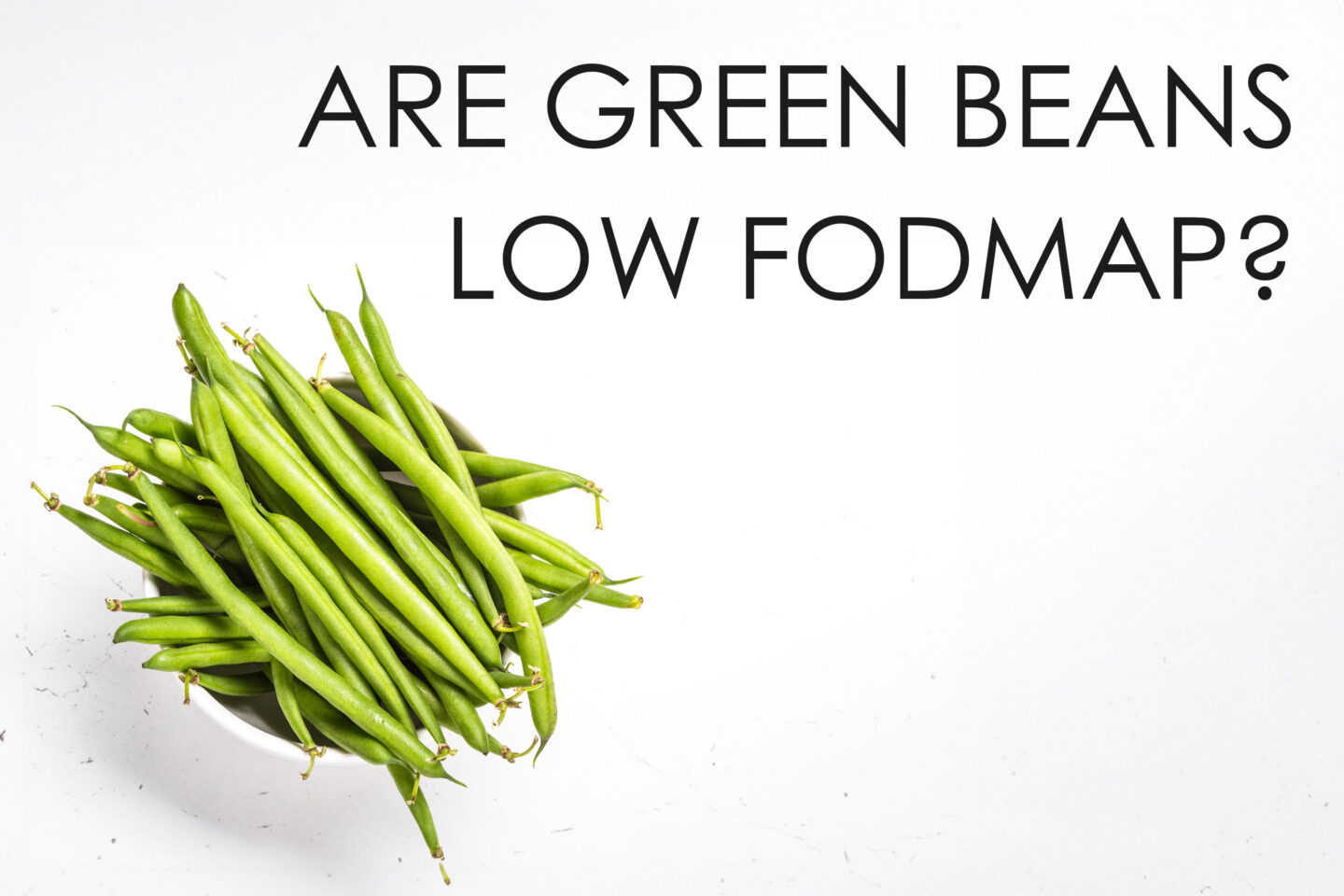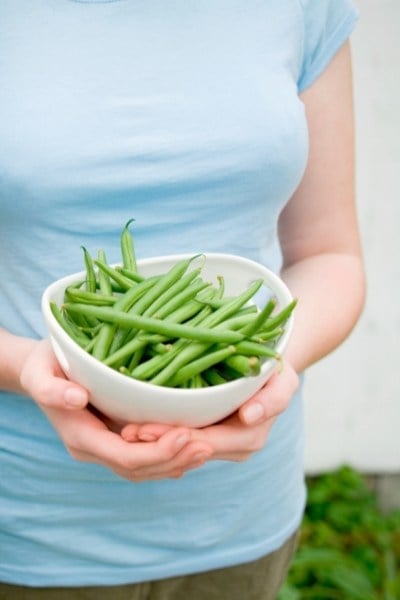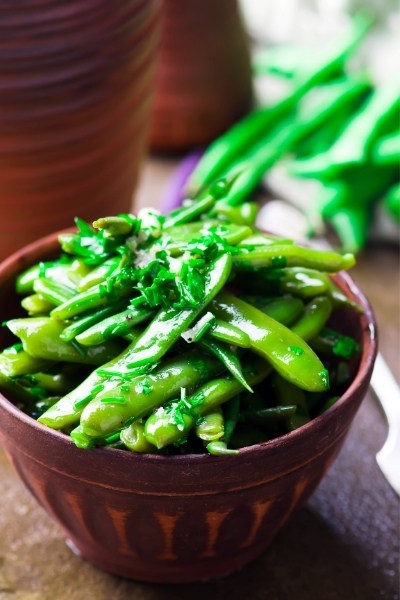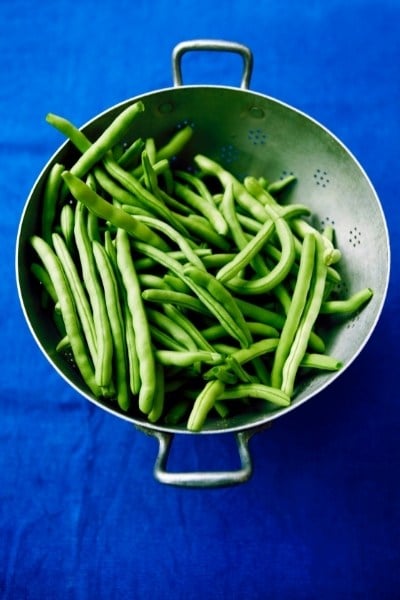Following a diet low in FODMAPs can be hard, especially at the beginning. FODMAPs are carbohydrates that are hard to digest for some people, particularly those with IBS.

So, to ease their symptoms, it might be beneficial to start a low-FODMAP diet.
Unfortunately, a large number of foods contain these types of indigestible carbs, but some of them can still be consumed on a low-FODMAP diet.
For example, how about some of the most common veggies, like green beans? Are green beans high or low in FODMAPs?
Table of Contents
Are Green Beans Low-FODMAP?
Green beans do contain some FODMAPs, but if you consume them in small quantities, they are considered to be low in these indigestible, fermentable carbs. So, they are safe for people with IBS.
What’s more, green beans are rich in fiber, antioxidants, and various nutrients that contribute to good health.

Eating them can also help prevent chronic conditions and diseases by boosting your immune system.
So, having some green beans from time to time is beneficial for everyone.
How low in FODMAPs are green beans?
A serving of 15 beans, or 75 grams, is considered to be low in FODMAPs and safe for people with IBS. So, as long as you stick to this serving, you can safely eat green beans on a low-FODMAP diet.
Unfortunately, larger quantities of green beans contain sorbitol, which is categorized as a FODMAP. So, make sure to stick to a smaller serving, especially if your IBS symptoms tend to be severe.
Can you eat green beans on a low-FODMAP diet?
In small quantities, green beans are a safe food for those with IBS and on a low-FODMAP diet. So, you can safely include them in your diet without triggering any symptoms.
It’s best to consume them boiled or steamed, though. That way, you’re preserving most of the nutrients and plant compounds, as well as lots of flavor. These cooking methods also don’t add any unnecessary carbs or calories.

Some people might be able to tolerate more green beans than others. So, always make sure to listen to your body and adjust your diet accordingly.
It’s best to start small in order to avoid any unnecessary digestive system issues.
Are canned green beans low in FODMAPs?
As long as you eat green beans canned in regular brine, you can have some on a low-FODMAP diet.
They still do contain indigestible carbs, though, so keep your servings small and as part of a healthy, balanced diet.
When choosing canned green beans and any other veggies for that matter, make sure to check that they don’t contain any onions or garlic.
These two are high in FODMAPs; people on a low-FODMAP diet should avoid them.
So, it’s important to always read the nutritional label and check the ingredient list.
Are green beans good for you?
Green beans are a very healthy veggie. They contain virtually no fat and are very low in calories, containing only about 44 calories in a one-cup serving. Because of that, green beans can be part of a weight-loss-friendly diet.
One cup of green beans contains 4 g of fiber, which is 16% of your daily recommended need for this nutrient.
This is yet another nutrient that can help you lose weight, as it helps you stay full after eating, preventing overeating.

Fiber is also important for the health of your digestive system, which is crucial for people with IBS and those on a low-FODMAP diet.
The type of fiber found in green beans can also help soak up excess stomach acid, reducing the symptoms of acid reflux and GERD.
So, eating green beans is great for your digestive system.
The same one-cup serving of cooked green beans also provides you with 25% of your daily need for vitamin K.
This micronutrient plays a crucial role in the formation of blood clotting factors and bone metabolism. A sufficient supply of vitamin K in your diet improves wound healing and prevents various bone-related issues.
It’s also important to remember that vitamin K is a fat-soluble nutrient. So, make sure to eat green beans and other vitamin K-rich foods with a source of healthy fats to ensure proper absorption.
Green beans are also a great source of folate. Also known are vitamin B9 or folic acid. This nutrient is important for the formation of red blood cells and the healthy growth and function of all your cells.
Folate is particularly important during early pregnancy, as it helps reduce the risk of birth defects of the brain and spine.
Doctors often include it in their prescriptions for prenatal supplements, but it’s best to get it from natural sources, such as green beans.
Green beans also pack a great dose of manganese. In fact, one cup of cooked green beans contains 18% of your daily need for this mineral.
Manganese helps your body form connective tissues, blood clotting factors, bones, and sex hormones. It also contributes to the metabolism of carbohydrates and calcium absorption.
Many people suffer from mineral deficiencies these days, so eating a lot of mineral-rich foods can help prevent them.

Just like all fresh veggies, green beans are high in antioxidants. These plant compounds help flush out free radicals from your body, which prevents oxidative stress and damage to your cells.
Oxidative stress is linked with various chronic conditions like heart disease, diabetes, cancer, and many more. So, eating a lot of antioxidant-rich foods can help prevent these problems.
As you can see, green beans come with an abundance of nutrients and plant compounds that can improve your health and wellbeing.
Conclusion
In small servings, green beans are a perfect food for a low-FODMAP diet and for those struggling with IBS. They do contain some indigestible carbs, but the amount is small, so eating them won’t trigger any IBS symptoms.
In addition, green beans are packed with nutrients and plant compounds beneficial for your health.
So, if you’re looking for a low-calorie but nutrient-dense veggie to add to your diet, green beans are an excellent choice.
Sources: Nutrition Data, Cleveland Clinic, and National Library of Medicine
